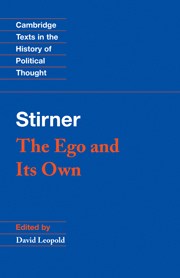Book contents
- Frontmatter
- Contents
- Acknowledgements
- Introduction
- Principal events in Stimer's life
- Further reading
- Note on the translation
- The Ego and Its Own
- First Part: MAN
- Second Part: I
- Biographical and other notes on the text
- Index of subjects
- Index of proper names
- Cambridge Texts in the History of Political Thought
Introduction
Published online by Cambridge University Press: 05 June 2012
- Frontmatter
- Contents
- Acknowledgements
- Introduction
- Principal events in Stimer's life
- Further reading
- Note on the translation
- The Ego and Its Own
- First Part: MAN
- Second Part: I
- Biographical and other notes on the text
- Index of subjects
- Index of proper names
- Cambridge Texts in the History of Political Thought
Summary
The Ego and Its Own has been called ‘the most revolutionary [book] ever written’, and yet, when the Leipzig Kreisdirektion seized part of the first edition, the Saxon Minister for the Interior ordered the release of the confiscated copies on the grounds that the book was ‘too absurd’ to constitute a danger to social or political order. Of all possible responses to Max Stirner's work, indifference is perhaps the most unlikely.
But Stirner's book is not only striking and provocative; it has also played an important, if neglected, role in the history of political thought. Stirner's polemic was, most obviously, an impulse to, and an indication of, the decline of the Hegelian left as a coherent intellectual movement. But it was, also, central to the formation of Marxism, forcing Karl Marx to break with left Hegelian modes of thought (he discusses the book in unparalleled detail over some 400 pages of The German Ideology). Since then The Ego and Its Own has appeared ambiguous enough to provide subsequent generations with their own Stirner. For example, at the turn of the century, The Ego and Its Own was taken up – not least because of its adumbration of libertarian themes in its discussion of property and the state – as a founding text of individualist anarchism (especially in America, where it was an important influence on Benjamin R. Tucker and the journal Liberty).
- Type
- Chapter
- Information
- Stirner: The Ego and its Own , pp. xi - xxxiiPublisher: Cambridge University PressPrint publication year: 1995



